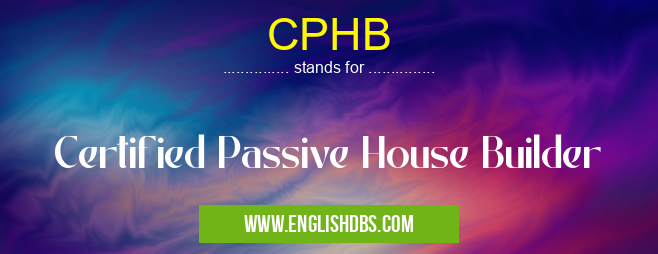What does CPHB mean in CERTIFICATIONS & DIPLOMAS
Certified Passive House Builders or CPHB are professionals who have been certified to build buildings and structures according to the rules and regulations of Passive House standards. Passive house building is a modern construction technique that focuses on energy efficiency, reducing environmental impact and creating comfortable living spaces with minimal use of energy resources. Buildings constructed as per the passive house standard not only save energy but also improve air quality indoors, and are more beneficial for the environment than traditional construction methods.

CPHB meaning in Certifications & Diplomas in Business
CPHB mostly used in an acronym Certifications & Diplomas in Category Business that means Certified Passive House Builder
Shorthand: CPHB,
Full Form: Certified Passive House Builder
For more information of "Certified Passive House Builder", see the section below.
What is CPHB?
CPHB stands for Certified Passive House Builder, which is a certification provided by the International Passive House Association (IPHA). The certification verifies that an individual has the requisite skills to design and construct buildings according to the strict principles of passive house building. In order to become certified, one must complete an extensive training program which includes learning about fundamentals of PH construction, energy modelling, airtightness techniques, material selection and more. Once certified, one can apply their knowledge towards constructing new residential and commercial buildings that meet the high standards of PH building techniques.
Advantages of Certification
CPHB certification provides many advantages for its holders such as access to exclusive IPHA products like software tools and information resources; access to PH networks, special discounts from PH manufacturers, subsidies from government programs and other incentives; various job opportunities as PH experts in the construction industry; higher pay rates than non-certified workers;etc. With CPHB certification, one can demonstrate their expertise in designing and constructing buildings according to high standards while adhering to all applicable regulations and safety procedures.
Essential Questions and Answers on Certified Passive House Builder in "BUSINESS»CERTIFICATES"
What is a Certified Passive House Builder?
A Certified Passive House Builder is an experienced and qualified professional who has taken courses in the construction of passive houses, which are buildings designed to reduce energy costs by maximising natural insulation. The builder will have a thorough understanding of all aspects of passive house building, from materials to design. They are able to provide advice on how to build a comfortable home that is incredibly efficient both financially and environmentally.
What makes a Passive House different from any other type of building?
Passive Houses use the principles of thermal insulation and airtightness to create an efficient building envelope that helps broaden the range of climates in which you can comfortably live. This allows for reduced energy inputs while providing more internal comfort throughout the year than regular homes.
What makes higher efficiency possible with Passive Houses?
Passive Houses are designed with increased levels of insulation, airtightness, solar gain, and ventilation control compared to conventional buildings, which help reduce air leakage and retain heat better. These measures result in greatly improved efficiency in comparison with traditional homes.
What kind of features do Certified Passive House Builders possess?
Certified Passive House Builders have extensive knowledge about passive house design and construction best practices. They understand what components need to be used in order for a structure to be considered a passive house, such as insulated walls or windows. They also use specific tools like blower door tests and infrared cameras during construction to assess the quality of their workmanship.
How does energy savings play into building a home with a Certified Passive House Builder?
Building with a Certified Passive House Builder results in significant energy savings compared to traditional homebuilding methods due to improved insulation, air sealing techniques, and other efficiency measures that reduce drafts and optimize temperature control throughout your home.
Is there any difference between Certified Passive House Builders and regular builders?
Yes – while both types of professionals offer services related to residential building projects, only the certified team can make sure that your new home meets the exact standards specified by the international Passivhaus Institute for optimal energy performance obtained through detailed planning during its development stages.
Does working with a Certified Passive House Builder increase safety at my home?
Yes! Safety is paramount when it comes to residential construction projects as most homes contain hazardous materials such as asbestos or lead paint; additionally working on tight time frames leads many constructors trying to rush through jobs without properly considering safety measures, increasing risks significantly. With CRHBs having specialized training and access to specific safety protocols recommended by passivhaus institute these risks are greatly reduced.
Does hiring a Certified PHB ensure increased durability for my project?
Absolutely! The PHBs prioritize tight construction methods that reduce air leakage thus improving overall durability not just for now but also for years ahead since they warranty their work well beyond typical warranties offered by regular contractors.
Final Words:
Certified Passive House Builders or CPHBs are professionals whose expertise lies in constructing residential or commercial structures according to the stringent rules set forth by passive house standards. Certified builders benefit from exclusive discounts on materials from leading brands; unique job opportunities in the industry; higher pay rates than non-certified workers; etc., all while helping create greener buildings with improved energy efficiency that last longer than traditional structures.
